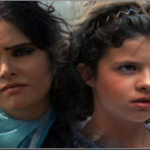This Fiction Friday Monday (sorry it’s late), we continue last week’s story about Nadia, a character from the wonderful imaginations of the Mind’s Eye series creators Tom Brown and Hande Barutçuoğlu:
Unlike most Travelers, Nadia didn’t mind winters. She knew it was because she was still too young to worry about most of the problems the northern winds brought with them along with the frost. With the grass gone, the horses needed hay. Also, the campfires needed dry wood, the water barrels kept freezing, and almost every morning a wagon had to be dug out of the rock-hard mud because its wheels had frozen into it overnight. Those were problems for adults too, things she would not have to deal with for another year or two yet.
True, it was near impossible for anyone to stay warm enough or clean enough, or to stay healthy for that matter; catching a runny nose or a hacking cough was just a matter of time. But Nadia seemed to be more resistant than most children. Besides, she loved seeing the horses in their shaggy winter coats, and food didn’t spoil as easily in the cold. But more than anything, she loved winter camp, when they drove their wagons out of the countryside and settled close to cities to have access to business, commodities and the warmth of barns on stormy nights. Nadia found cities fascinating, with their dull colours and lively streets, full of people and sounds and sights unfamiliar, and shops full of strange and wondrous objects.
This winter, the wind had blown the Travellers onto a city bigger than Nadia had ever seen. The buildings were taller than trees, the streets seemed to stretch on infinitely, and there were people everywhere, all the time.
“Such a crowded place,” her older brother Istvan commented. “And it’s not even market day.” They had left the camp together early in the afternoon to explore the city.
Nadia nodded in agreement, trying not to stare at the people they passed. She noted a few guards in uniform, a priest, and a rich man on horseback with clothes as colourful as the Travellers, but made of much finer fabric. On the same street, she also noticed an old woman in rags trying to sell mouldy bundles of dried thyme, a man bent double under the weight of a stack of damp firewood, and two grimy children younger than herself, begging for food from strangers. She found it hard to comprehend. Why does nobody help them? she wondered. Why does nobody even notice them?
Nadia was used to the way of the Travellers, where the sick and the poor were always taken care of. “A miserable person makes a miserable tribe,” her father always said. “Misery feeds envy, and with envy comes hate.” So the Travellers always made sure everyone had enough, and that no one had reason to envy another’s wealth. Not that anyone in the tribe was wealthy, but everyone had enough.
She walked up to the beggar children, who were shivering against the biting wind. She didn’t have any food or money to offer them, but there had to be something else she could do. After a moment of thinking, she took off the wool scarf draped over her hair, and wrapped it around the shoulders of the children. She could always knit another one. “There, that should keep you a bit warmer.” The children thanked her timidly and walked away, clearly unused to such generosity. Nadia shook her head. “This is just wrong,” she said, half to herself and half to Istvan.
“I agree.” Her brother looked around nervously. “This whole place is wrong. Let’s get back to camp, I could use a cup of hot tea.” He laid a hand on Nadia’s shoulder, and gently led her back to the main road, towards the colorful wagons in the distance.
As they got closer to camp, Nadia could see Istvan growing restless. She struggled to catch up with his quickened steps. “What is going on?” she asked. Instead of answering, her brother pointed towards the edge of camp. Now they were close enough for Nadia to see a dozen or so city guards standing by her family’s wagon. From their animated gestures, she could tell they weren’t there to buy pots or have their fortunes told.
Without another word, Istvan broke into a run. Nadia had no choice but to gather her skirts and run after him. When she reached camp, in a cold sweat and out of breath, her father was blocking the wagon’s only entrance with his body, as the guards tried to push their way past him. “This is my home,” he shouted hoarsely. “You cannot just force your way in, do you hear me? We don’t have what you are looking for!” Nadia’s mother stood beside him, just as ready to defend her home.
By this point, the entire camp had gathered around the wagon. Several dozen Travellers, men and women and children, surrounded the guards quietly yet menacingly. Nadia sidled up to one of the younger women. “What do they want?” she asked in a whisper.
“The key to City Hall’s treasure room,” the woman muttered. “Apparently someone stole it from a guard this morning, and of course the townies think one of us took it.” She shook her head.
Nadia knew what she meant. Settled folk were weary of Travellers, and considered them all thieves and ruffians.
“The guards were harassing some of the boys. Your father told them to go away,” the woman added. “That’s why they are picking on him. Once they find out he doesn’t have the key, the rest of us will be in line as suspects.”
Nadia saw Istvan make his way towards the front of the crowd to stand beside his parents. His eyes scanned the crowd quickly, and met with Nadia’s. “Stay there,” he mouthed. Nadia nodded mutely.
One of the guards chose that moment to push his way past Istvan, waved his truncheon threateningly towards Nadia’s father. “You call that scum hole a home?” he sneered. “Get out of my way you pikey, you’re detaining the law.”
Nadia saw Istvan take a rough step towards the guard, getting between him and their father. Everything after that happened very quickly.
The guard grabbed Istvan by the shoulder of his jacket and tried to push him away. Istvan responded with a punch, which knocked the guard off his feet. Instantly, the other guards were on him, and the entire camp of Travellers on the guards. Then several of the guards blew their whistles.
It was pandemonium. Sticks and truncheons were swinging everywhere, the frightened horses were neighing and the younger children were crying and scurrying for their mothers. Nadia was overwhelmed by a sense of panic, not knowing what to do with herself. She tried, in vain to reach her family but they were at the centre of the commotion and she couldn’t even catch a glimpse of them among the angry, fighting bodies. “Istvan!” she shouted frantically. “Dya! Dad!”
“Nadia, run!” Her mother’s voice carried over the din like an alarm bell. The note of desperation in it was unmistakable, and so foreign to Nadia that it doubled her fear. Looking around, she saw that the crowd of guards and Travellers was growing into a mob. The guards’ whistles, which attracted more guards from nearby, also started to attract the city people, who were only too eager to drive the Gypsies off their land. All the Travellers’ children, she realized, had disappeared. There was only one thing left for Nadia to do. Taking her mother’s words to heart, she ran.
Her only choices being the frozen countryside and the city, Nadia found herself running into town. She would be harder to spot among people, and perhaps she could find a place to hide. Groups of townspeople bearing sticks and shovels and other makeshift weapons ran through the streets towards camp, yelling obscenities and attacking anyone with darker skin or colourful clothes. Nadia saw a poor old man get trampled by them. Fearing for her own life, she dove into an alleyway that was half blocked by a heap of mouldy straw and rotting cabbage leaves. For lack of a better place to hide, she ducked behind the garbage heap.
She wasn’t alone. Beside her, with their backs half-buried into the garbage, were the two beggar children and a man with a pale round face. From the terrified expression on the children’s face, Nadia could tell that the man was a stranger to them. He had a mole under his left eye, shaped like a tear. Nadia’s mind raced back to her mother, and the fortune she had read in the man’s teacup. Then her eyes shifted towards the man’s hands that were clutched around a large, gilded key. “It’s you…” she whispered.
The man put a finger to his lips. “Quiet,” he muttered. “If they hear you, we all are as good as dead.” He moved over to make room for Nadia.
“You caused all this!” Nadia breathed through the sound of angry shouts and stomping footsteps.
The man nodded mutely, and for a moment his shame was written so openly in his round face that Nadia felt pity for him. “Can you return it?” she grimaced, knowing the answer already. Who would want to own up to a crime like this? “You could tell the guards you found it,” she added meekly.
“It’s too late.” The man shook his head. As he did, coins tinkled in his bulging pockets, and Nadia saw the glint of gold in one of them. You have already robbed the City Hall, she thought. That is why the townspeople are so furious. It really is too late.
She wanted to punch the man beside her, shake him, hurt him, make him pay for what he had done, but she knew that would be useless. What was done was done, and nothing she would do could change it. Instead, she pulled her knees to her chest, and watched the night fall on the city slowly and painfully.
She woke up to the chattering of her own teeth and only then realized that she had fallen asleep. The tear-marked man and the children were gone, and the twilit streets were deathly quiet, even though the screams of the mob were still echoing in her head from the night before. As she tried to get up, her muscles stiff with cold, she noticed something glittering on the ground beside her. She brushed some straw away to find a couple of gold coins, then her numb fingers closed around something long and slender. She picked up the key and hid it in her stocking, hoping against hope that it might be of some help to clear her family’s name.
Upon the thought of her family, a bitter feeling sank down her chest, colder than the icy winter dawn. She gathered her skirts and ran. Out of the alleyway, into the empty streets, out of this cursed city that she had come to loathe.
She ran until her lungs were on fire, and when she reached the campgrounds she was sweating despite the cold, out of breath and light-headed. There was nothing left of the camp. Nothing. Just wind and dust. Tears running down her cheeks, Nadia tried to fathom what had become of them. Maybe they had run away? That’s it, she told herself. They ran away. They must have. Any other possibility was just too much for her mind to handle at the moment.
A few dark spots on the frozen ground caught her tear-blurred sight. She walked around to find familiar objects scattered on the ground: an oat bag from someone’s horse, a tin cup, a green knit scarf, a yarn doll, and a deck of cards held together with a scrap of purple fabric… Dya’s fortune cards.
She picked up the deck, and wrapped the scarf around her bare head. Then she pulled the key from her stocking, and with all her strength and fury, hurled it as far as she could toward the horizon.
Not knowing where she was heading, Nadia strode away from the city, wondering what her Fate would make of her, or as her mother had said, what she would make of her Fate.







Comments are closed.